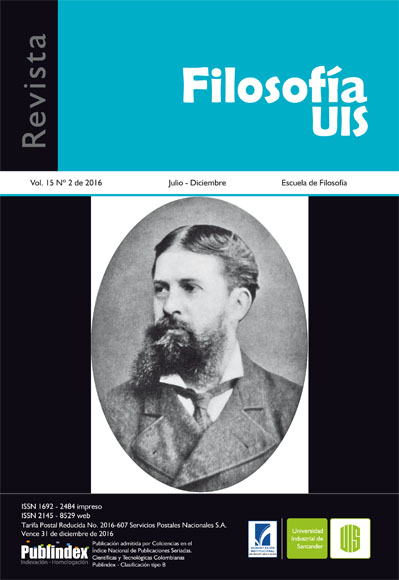Research Article
Forma mentis: appearance and reality in the Germania of Tacitus
Published 2016-11-30
Keywords
- mind,
- form,
- appearance,
- reality,
- eternity
How to Cite
Gabriel Caputo, R. (2016). Forma mentis: appearance and reality in the Germania of Tacitus. Revista Filosofía UIS, 15(2), 111–135. https://doi.org/10.18273/revfil.v15n2-2016006
Copyright (c) 2016 Revista Filosofía UIS

This work is licensed under a Creative Commons Attribution 4.0 International License.
Abstract
The aim of this paper is to analyze the Germania of Tacitus as an ethnographic as well as an autoethnographic text, i.e. as a criticism of the Roman society. After rejecting the philosophical presuppositions that underlie Ellen O’Gorman’s “No Place like Rome: Identity and Difference in The Germania of Tacitus” (§1), we analyze the ethnographic writing of Tacitus and its Roman context (war and trade), emphasising the ideas of form, beauty, matter, mores and mind (§2). Finally, we conclude underlining the utopian and critical possibilities that gave and give shape to this text (§3).Downloads
Download data is not yet available.
References
- Ash, R. (Ed.). (2012). Tacitus (Oxford Readings in Classical Studies). Oxford: Oxford University Press.
- Boissier, G. (1904). Tacite. Paris: Hachette.
- Caesar (1958). Bellum Gallicum / The Gallic War. H. J. Edwards (Ed.). London: Harvard University Press- Heinemann.
- Cioran, E.M. (1999 [1960]). Histoire et utopie. Paris : Gallimard.
- Dench, E. (2007). “Ethnography and History”. Marincola, J. (Ed.) A Companion to Greek and Roman Historiography, Vol. II. Singapore: Blackwell.
- Derrida, J. (1979 [1967]). L’écriture et la différence. Paris: Éditions du Seuil.
- Derrida, J. (1989). La escritura y la diferencia. Barcelona: Anthropos.
- Gudeman, A. (1900). “The Sources of the Germania”. En Transactions and proceedings of the American Philological Association, (31) , 93-111.
- Hartog, F. (2003). El espejo de Heródoto. México:Fondo de Cultura Económica.
- Heidegger, M. (1957). Identität und Differenz. Stuttgart: Klett-Cotta.
- Krebs, C. B. (2011). A Most Dangerous Book. Tacitus’s Germania from the Roman Empire to the Third Reich. New York–London: W.W. Norton & Co.
- Momigliano, A. (1984 [1960]). “Some Observations on Causes of War in Ancient Historiography” Secondo contributo alla storia degli studi classici. Roma: Edizioni di Storia e Letteratura.
- O’Gorman, E. (1993). “No Place like Rome: Identity and Difference in the Germania of Tacitus”. Ramus, 22 (2), 135-154.
- Oxford Latin Dictionary (1968). Oxford: Clarendon.
- Proust, M. (1984 [1913]). À la recherche du temps perdu. 1. Du côté de chez Swann.
- Rives, J. (2012). “Germania”Pagán, V.E. (Ed.). A Companion to Tacitus. MaldenOxford: Willey-Blackwell.
- Ross, J. W. (1878). Tacitus and Bracciolini: The Annals forged in the XVth Century. London: Diprose & Bateman.
- Salluste (1924). De coniuratione Catilinae / Conjuration de Catilina / Bellum Iugurthinum / Guerre de Jugurtha. B. Ornstein y J.Roman ](Eds). Paris: Les Belles Lettres.
- Suetonius (1914). Lives of the Caesar. J. C. Rolfe (Tras.). Massachusetts: Harvard University Press.
- Syme, R. (1958). Tacitus. Vol.1. Oxford: Clarendon.
- Tacite (1921). Histoires. H. Goelzer (Ed.). Paris: Les Belles Lettres.
- Tacite (1922). Dialogue des orateurs / Vie D’Agricola / La Germanie. H. Goelz, H.
- Bornecque, G. Rabaud (Eds.). Paris: Les Belles Lettres.
- Tacite (1923). Annales. H. Goelzer (Ed.). Paris: Les Belles Lettres.
- Tácito (2001). Agrícola / Germania / Diálogo sobre los oradores. J.M. Requejo (Ed.).Gredos. Madrid.
- Tácito (2001). Anales. J.L. Moralejo (Ed.). Gredos: Madrid.
- Tacito (1983). La Germania. Canali (Ed.). Pordenone: Studio Tesi.
- Tacitus (1914). Dialogus. Agricola. Germania. W. Peterson M. Hutton (Eds.). London-New York: Heinemann-MacMillan.
- Tacitus (2007). Germania. M. Fuhrmann (Ed.). Stuttgart: Reclam.
- Thomas, R. (1982). Lands and Peoples in Roman Poetry: The Ethnographical Tradition. Cambridge.
- Thomas, R. (2009). “The Germania as a Literary Text”. The Cambridge Companion to Tacitus. Woodman, A. (Ed.). Cambridge: Cambridge University Press.
- Thompson, M. (2007) “Primitive or Ideal? Gender and Ethnocentrism in Roman Accounts of Germany”. Studies in Mediterranean Antiquity and Classics, 1.
